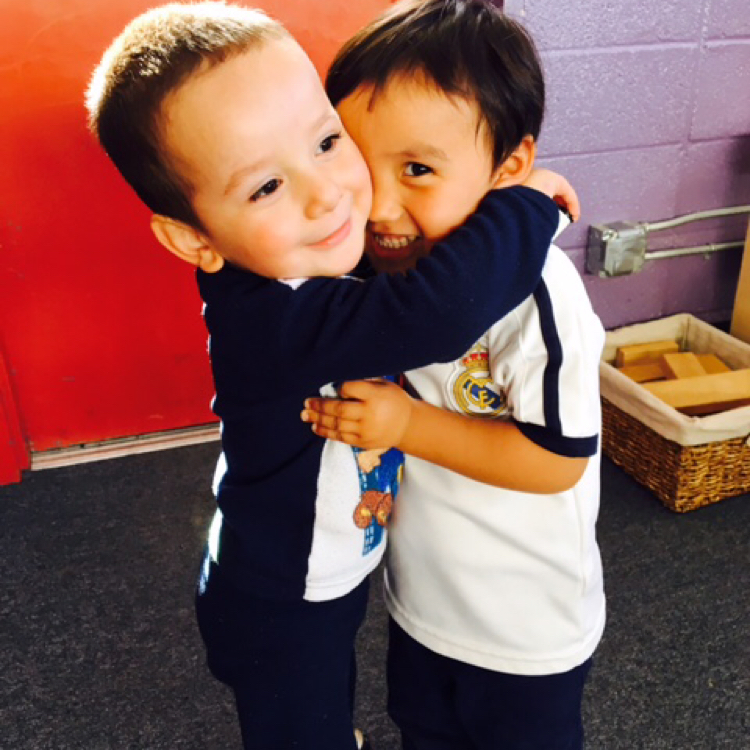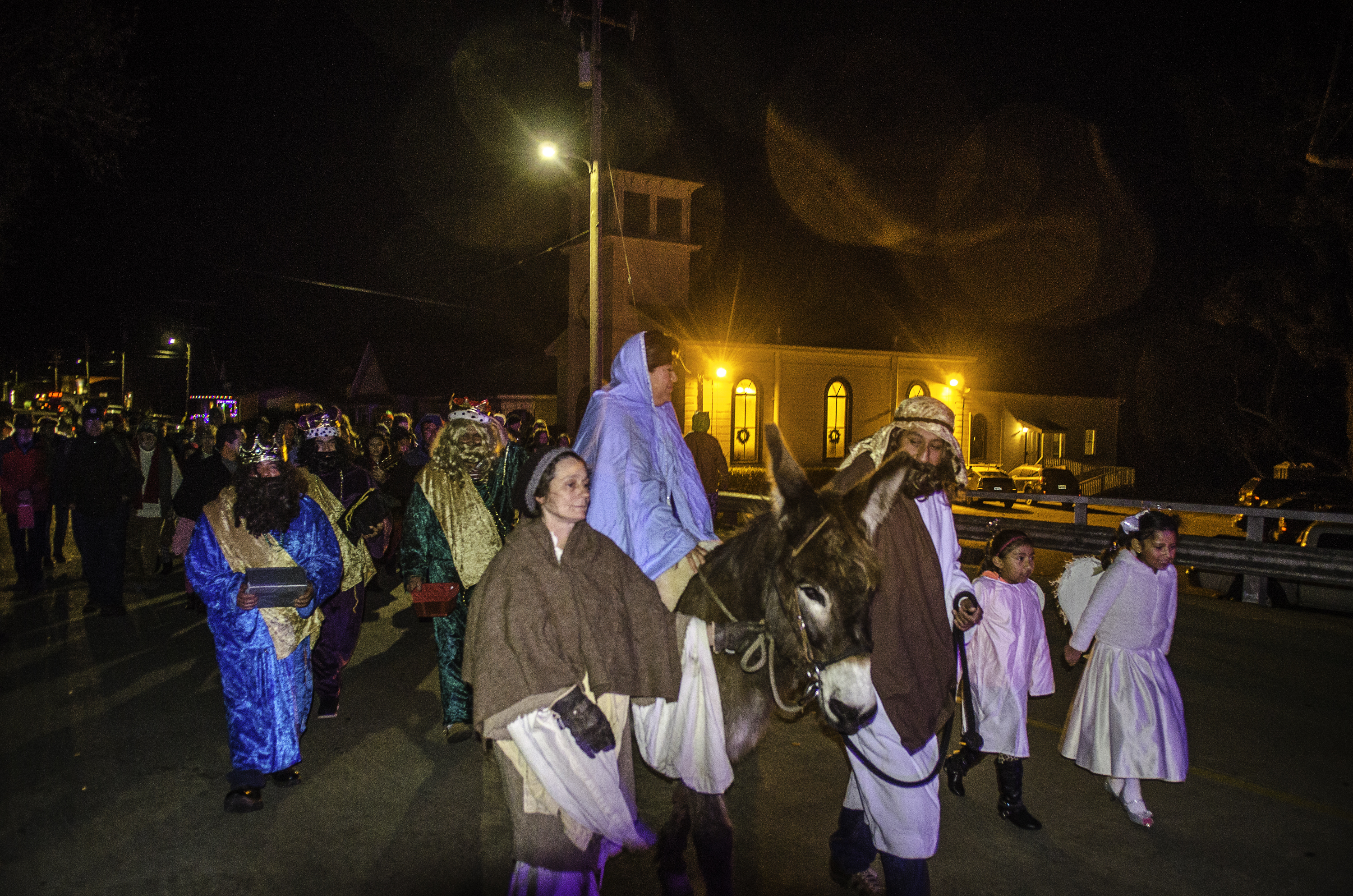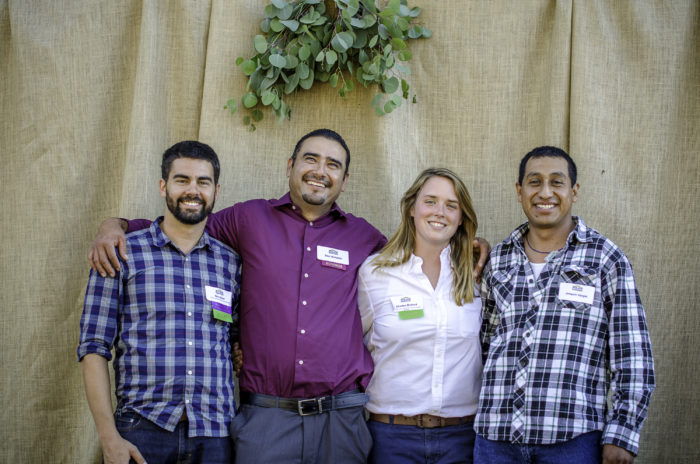
Fear and anxiety tore through the Latino community on the South Coast in the wake of Donald Trump’s election victory last month. Hundreds of residents in the greater Pescadero area belong to “mixed-status” families: some family members were born in U.S., while others, sometimes their parents, aunts and uncles, crossed the border without papers.
“Now we worry about what will happen if we actually get deported – what will happen to our siblings that were born here? Should we pack ourselves up and go to Mexico?” worries Tadeo Renteria, who was one when his parents brought him over the border. He’s 22 now, and has lived in Pescadero all his life. (Tadeo’s name has been changed).
He and his older brother are not citizens, but his two younger siblings are. The youngest, his 8-year-old sister Paloma, is especially frightened of being separated from her family and is too young to understand what all the repercussions of the election could entail. Kids in her class came to school crying the day after the election because they thought they would need to leave the country immediately.
“When the day comes, we have to be prepared. We constantly have little talks with our mom, like, what are we going to do? In your mind, you prepare, but actually there’s not much you can do. You don’t know what’s going to happen,” says Tadeo.
Families like Tadeo’s are paralyzed by uncertainty, and that may be the worst part. The ambiguity of their situation and their futures is hard to take.
To help community members face that uncertainty, and to understand the possible outcomes, Puente organized a Post-Election Community Forum on December 8. Puente invited noted immigration attorney David Pasternak and a representative from the Legal Aid Society of San Mateo County to answer questions about legal rights, and a member of the San Mateo County Sheriff’s Office to discuss enforcement.
The bilingual event drew more than 60 people, some of them Anglo residents eager to unite in solidarity with their Latino neighbors and let them know they’re not alone. Puente’s Iris Fernandez, a licensed therapist, gave everyone a chance to discuss their feelings: the fear, the anger. Some people said they were physically sick after the election.
“People talked about their worry for their children. Parents asked, should we have these conversations with our kids, or not expose them to this news?” says Rita Mancera, Executive Director of Puente.
Fernandez offered ideas for self-care, reminded people to exercise, to remember to breathe when watching the news, and to try to think positive thoughts.
“Don’t believe in the frame that’s being presented of you – that you’re doing something ‘wrong’ or that you’re bad,” she reminded them.
Tadeo knows all about that feeling. As a boy, he remembers that his father taught him to fear the government. He didn’t understand why, but he knew to be fearful.
“He taught me how to navigate – be vigilant, look for certain things… if anyone’s looking at you wrong, be prepared to run,” recalls Tadeo. “Ever since I was a kid, every time I’d see a police officer, the first thing on my mind was, ‘Should I be ready to run?’”
It was fear that prevented Tadeo from going on a class trip to Washington, DC in middle school with his classmates, for fear that even buying a plane ticket would put his name into a government database, and that he would be detained.
To this day, he has never been on an airplane for that reason.
“You’re going to get thrown into a dark hole. You don’t know what’s going to happen to you,” says Tadeo, describing his nightmare scenario. He also deeply fears Mexico, which he has heard described as a poor and violent place.
“If I were sent there, I wouldn’t know what do, or who to call, or who my family is there – it’s scary,” he says.
But Tadeo’s biggest fear right now is that Trump will make good on his stated commitment to revoke DACA (Deferred Action for Childhood Arrivals). DACA means Tadeo has been able to work legally, get a driver’s license and apply for grant money to pay for his college expenses. Without his DACA permit, Tadeo would lose everything. He would likely drop out of community college. His future would be pinched to the size of a keyhole.
Puente helped Tadeo and dozens of other local youth apply for (and renew) their DACA permits. Its immigration services team will strongly defend the rights of anyone threatened with deportation, says Mancera.
“We need to be ready to respond to whatever happens on Day One, Day Two, and Day Three to support our families right now,” she adds.
Puente is preparing for a number of contingencies, including scenarios where Immigration & Customs Enforcement shows up at Puente’s offices, looking for people. (Puente will go into lockdown). Puente is also prepared to hire outside immigration attorneys if there were a raid or mass arrests, and would solicit donations to cover the costs.
In the meantime, Puente is working hard to inform itself and the community. “People say we need to give Trump a fair shot, but we can’t forget what he’s said about people like Tadeo and our community, the Latino community. We’re expecting the worst because he’s said the worst,” says Mancera.
As we plan for the new year and the programming and support we will provide for our community, we thank you, our donors, volunteers, partners and friends, for the ongoing support you provide. It’s not too late to make a donation to Puente’s year-end campaign! Won’t you please make a donation to help us with our vital work?
**********
Preparándose para lo Peor: Las Familias Latinas Se Enfrentan a los Resultados de las Elecciones
El miedo y la ansiedad se abrieron camino en la comunidad latina de la Costa Sur tras la victoria de Donald Trump en las elecciones del pasado mes. Centenares de residentes de la zona de Pescadero pertenecen a familias en situación mixta: algunos miembros de la familia nacieron en los Estados Unidos mientras que otros, a veces los padres, tías y tíos, cruzaron la frontera sin documentación.
“Ahora nos preocupamos por lo que va a ocurrir si de hecho nos deportan – ¿qué pasará con nuestros hermanos y hermanas que nacieron aquí? ¿Deberíamos hacer las maletas e irnos a México?” Se pregunta Tadeo Rentería, que tenía un año cuando sus padres lo trajeron cruzando la frontera. Ahora tiene 22 años y ha vivido en Pescadero toda su vida (el nombre de Tadeo se ha cambiado).
Ni él ni su hermana mayor son ciudadanos, pero sus dos hermanos más jóvenes sí lo son. La más joven, Paloma, de ocho años, está especialmente asustada porque la separen de su familia, y es demasiado joven para entender todas las repercusiones que las elecciones podrían traer consigo. Los niños de su clase vinieron a la escuela llorando al día siguiente de las elecciones porque pensaban que tendrían que dejar el país inmediatamente.
“Cuando llegue el día, tenemos que estar preparados. Continuamente tenemos charlas con nuestra madre y nos preguntamos ¿qué vamos a hacer? En tu mente te preparas pero, en realidad, no hay mucho que puedas hacer. No sabes lo que va a ocurrir,” dice Tadeo.
Las familias como la de Tadeo están paralizadas por la incertidumbre y eso puede ser la peor parte. La ambigüedad de su situación y su futuro es difícil de asumir.
Para ayudar a los miembros de la comunidad a enfrentarse a la incertidumbre y a entender los posibles resultados, Puente organizó un Foro Comunitario Post-elecciones el día 8 de diciembre. Puente invitó al destacado abogado de inmigración David Pasternak y a un representante de la Sociedad de Ayuda Legal del condado de San Mateo para responder a preguntas sobre derechos legales, y a un miembro de la oficina del sheriff del condado de San Mateo para discutir su puesta en práctica.
Este evento bilingüe atrajo a más de 60 personas, algunas de ellas residentes anglófonos deseosos de unirse en solidaridad con sus vecinos latinos y hacerles saber que no están solos. Iris Fernández, una terapeuta licenciada de Puente, dio a todo el mundo la oportunidad de discutir sus sentimientos: el miedo, la furia. Algunas personas dijeron que se sentían físicamente enfermas tras las elecciones.
“La gente habló sobre sus preocupaciones por sus niños. Los padres preguntaron ¿debemos tener estas conversaciones con nuestros niños, o no a exponerles a estas noticias?” Dice Rita Mancera, Directora Ejecutiva de Puente.
Fernández ofreció ideas para la autoayuda, recordó a la gente que hicieran ejercicio, y que recordaran respirar cuando vieran las noticias, y que intentaran tener pensamientos positivos.
“No crean en el enfoque que les están presentando – que ustedes han hecho algo “malo” o que ustedes son malos,” les recordó.
Tadeo conoce muy bien estos sentimientos. Recuerda que cuando era niño su padre le enseñó a tener miedo del gobierno. Él no entendía por qué, pero sabía que tenía que tener miedo.
“Él me enseñó cómo desenvolverme – estar vigilante, fijarme en ciertas cosas… Si alguien te mira de mala manera, prepárate para correr,” recuerda Tadeo. “Desde que era niño cada vez que veía a un oficial de policía la primera cosa en mi mente era ¿debería prepararme para correr?”
Fue el miedo el que impidió a Tadeo ir a un paseo con su clase a Washington DC en la escuela secundaria con sus compañeros de clase, por miedo a que por comprar un boleto de avión su nombre fuera puesto en una base de datos del gobierno, y que fuera detenido.
Hasta la fecha nunca ha estado en un avión por esa razón.
“Te van a meter en un agujero negro. No sabes lo que va a pasar contigo,” dice Tadeo, describiendo su pesadilla. También le tiene mucho miedo a México, del que le han contado que es un lugar pobre y con violencia.
“Si me mandaran allí, no sabría qué hacer, o a quién llamar, o quién es mi familia allí – me da miedo,” dice.
Pero el principal miedo de Tadeo ahora es que Trump cumpla su compromiso de revocar el DACA (por sus siglas en inglés, Acción Diferida para los que Llegaron en la Infancia). DACA significa que Tadeo ha sido capaz de trabajar legalmente, obtener una licencia de manejo y solicitar el dinero de una beca para pagar sus gastos en la universidad. Sin el permiso de DACA, Tadeo perdería todo. Es muy probable que tuviera que abandonar el colegio comunitario. Su futuro quedaría reducido a una minucia.
Puente ayudó a Tadeo y a docenas de otros jóvenes locales a que solicitaran (y renovaran) sus permisos DACA. Su equipo de servicio de inmigración defenderá con fuerza los derechos de cualquiera que sea amenazado con la deportación, dice Mancera.
“Necesitamos estar listos para responder a cualquier cosa que ocurra en el primer, en el segundo y en el tercer día, y para apoyar a nuestras familias ahora mismo,” añade.
Puente está preparándose para un número de contingencias, incluyendo situaciones en que los agentes de los Servicios de Inmigración y Aduanas se presenten en las oficinas de Puente buscando a personas. (Puente entraría en situación de cierre inmediato). Puente también está preparándose para contratar abogados de inmigración externos si hubiera una redada o arrestos masivos, y solicitaría donaciones para cubrir los gastos.
Entretanto, Puente trabaja duro para informarse e informar a la comunidad. “La gente dice que tenemos que darle una oportunidad justa a Trump, pero no podemos olvidar lo que ha dicho sobre gente como Tadeo y nuestra comunidad, la comunidad latina. Estamos preparándonos para lo peor porque él ha dicho lo peor,” dice Mancera.
A medida que planeamos el nuevo año y las programas y el apoyo para proveer a nuestra comunidad, les agradecemos, a nuestros donantes, voluntarios, socios y amigos por el apoyo constante que proveen. ¡No es demasiado tarde para hacer una donación a la campaña de fin de año de Puente! ¿No haría usted una donación para ayudarnos con nuestro trabajo vital?

 A message from Rita Mancera, Executive Director, Puente.
A message from Rita Mancera, Executive Director, Puente.



